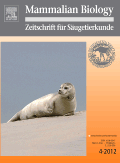
MAMMALIAN BIOLOGY
metrics 2024
Unveiling Insights in Mammalogy and Conservation
Introduction
Mammalian Biology is a premier peer-reviewed journal published by Springer Heidelberg, dedicated to the field of mammalogy and related disciplines. With an impressive impact factor and categorized within the top quartiles (Q1 and Q2) of Animal Science, Zoology, as well as Ecology, Evolution, Behavior, and Systematics, this journal serves as a vital platform for researchers and scholars to disseminate high-quality research findings. The journal’s open access options enhance visibility and accessibility, vital in today's collaborative research environment. Since its inception in 2001, Mammalian Biology has fostered a comprehensive understanding of mammal ecology, behavior, and conservation strategies, ensuring its significant contribution to the field. With a broad scope that encompasses evolutionary studies to ecological assessments, it promises to be an essential resource for professionals and students alike who aim to keep abreast of the latest advancements in mammalian studies. Located in Germany, the journal continues to thrive, adapting to emerging scientific inquiries and supporting the ongoing dialogue in mammalogy until at least 2024.
Metrics 2024
 0.56
0.56 1.90
1.90 1.80
1.80 53
53Metrics History
Rank 2024
Scopus
IF (Web Of Science)
JCI (Web Of Science)
Quartile History
Similar Journals
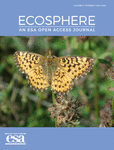
Ecosphere
Elevating the discourse in ecology and evolution.Ecosphere is a leading open-access journal published by WILEY, dedicated to advancing research in the fields of ecology, evolution, behavior, and systematics. Established in 2010 and headquartered in the United States, this innovative journal provides a platform for the exchange of cutting-edge scientific knowledge and discovery, fulfilling its mission to enhance our understanding of ecological systems and their interactions. With a prestigious impact factor reflecting its commitment to high-quality research, Ecosphere is ranked Q1 in both Ecology and Ecology, Evolution, Behavior, and Systematics for 2023, further solidifying its prominence in the scientific community. The journal's scope includes a wide array of topics related to environmental science, making it an essential resource for researchers, professionals, and students aiming to stay at the forefront of ecological research. It offers comprehensive open access options, ensuring that groundbreaking findings are readily available to a global audience, thus fostering collaboration and innovation in the field.
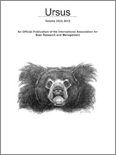
URSUS
Exploring the intersection of ecology and management for bear populations.URSUS is a pivotal academic journal dedicated to the interdisciplinary study of bear biology and conservation, fostering critical research that addresses both ecological and management issues facing bear populations. Published by the International Association for Bear Research and Management (IBA), this journal has evolved since its establishment in 1998, showcasing an impressive array of studies spanning various themes related to animal science, landscape conservation, and policy management. With an impactful presence in the field, URSUS holds a Q3 quartile ranking in the categories of Animal Science and Zoology, and Management, Monitoring, Policy and Law, as well as in Nature and Landscape Conservation, reflecting its contribution to advancing knowledge and addressing pressing concerns in wildlife management. Researchers and practitioners alike will find valuable insights in its pages, as the journal is committed to promoting best practices and informed strategies for bear conservation. For its readership, URSUS serves as a vital platform for collaborative dialogue, scientific discourse, and sharing transformative research outcomes that affect wildlife conservation efforts globally.
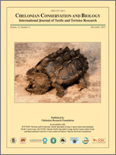
CHELONIAN CONSERVATION AND BIOLOGY
Fostering knowledge for the survival of chelonians.Chelonian Conservation and Biology is a distinguished academic journal dedicated to advancing the field of chelonian research, encompassing conservation, ecology, and biology of turtles and tortoises. Published by Allen Press Inc in the United States, this journal is well-regarded within the realm of Animal Science and Zoology, as well as Ecology, Evolution, Behavior and Systematics, holding a commendable Q3 ranking in both categories for 2023. With an ISSN of 1071-8443 and an E-ISSN of 1943-3956, the journal features a diverse range of articles aimed at professionals, researchers, and students, fostering an understanding of the critical challenges facing chelonians worldwide. Although not an open-access publication, Chelonian Conservation and Biology provides high-quality content, including original research, reviews, and case studies, encouraging engagement and collaboration among experts. With coverage extending from 2006 to 2024, the journal serves as a vital platform for disseminating knowledge and promoting conservation efforts essential to the survival of these remarkable species.
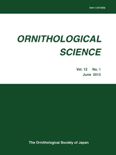
ORNITHOLOGICAL SCIENCE
Fostering impactful discourse in ornithological research.ORNITHOLOGICAL SCIENCE, published by the Ornithological Society of Japan in collaboration with the University of Tokyo, stands as a pivotal platform for advancing knowledge in the field of ornithology. With a keen focus on avian biology and conservation, this esteemed journal is dedicated to publishing high-quality research, reviews, and technical notes that explore the intricacies of bird science. Although currently categorized within the Q4 quartile in Animal Science and Zoology, the journal aims to elevate its standings by fostering scholarly communication and impactful scientific discourse. This journal has been consistently publishing since its inception in 2002, with a brief hiatus before resuming its invaluable contributions to the scientific community in 2009. Despite the absence of specific open access options, the journal remains a crucial resource for researchers, professionals, and students seeking to expand their understanding of avian ecology and behavior. Through its comprehensive scope, ORNITHOLOGICAL SCIENCE reflects the increasing importance of ornithological studies in addressing global biodiversity issues and conservation challenges.
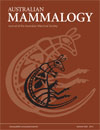
AUSTRALIAN MAMMALOGY
Championing Insights into Australia’s Diverse Mammal SpeciesAustralian Mammalogy, published by CSIRO PUBLISHING, is a pivotal journal in the fields of Animal Science and Zoology as well as Ecology, Evolution, Behavior and Systematics. With its ISSN 0310-0049 and E-ISSN 1836-7402, this esteemed journal has been instrumental in disseminating critical research findings since 2000, and continues to evolve up to 2024. Ranked in the Q2 quartile of both its categories for 2023, it showcases a diverse array of studies that contribute to understanding Australia’s unique mammalian fauna and its ecological dynamics. Researchers, professionals, and students will find valuable insights in its peer-reviewed articles, which are essential for advancing knowledge in these essential scientific disciplines. Located in Australia at UNIPARK, Locked Bag 10, Clayton, VIC, this journal remains committed to fostering scholarly communication within the global scientific community.
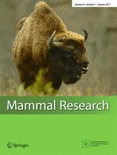
Mammal Research
Connecting Researchers to the Heart of Mammal StudiesMammal Research, published by Springer Heidelberg, is a prominent academic journal dedicated to advancing knowledge in the fields of Animal Science, Zoology, Ecology, Evolution, and Behavior. With an impressive Q2 ranking in both Animal Science and Zoology and Ecology, Evolution, Behavior and Systematics as of 2023, this journal is an essential resource for researchers and professionals seeking to publish innovative findings that contribute to our understanding of mammalian biology. The journal operates under an Open Access model, allowing a wide audience to access and engage with high-quality research articles. Converging between 2015 to 2024, Mammal Research serves as a vital platform for scholarly discourse, promoting rigorous scientific inquiry and collaboration among experts and students alike in the fascinating study of mammals.

Evolutionary Biology
Advancing Knowledge in Evolutionary SciencesEvolutionary Biology is a distinguished academic journal published by Springer, focusing on the intricate fields of ecology, evolution, behavior, and systematics. This journal, with the ISSN 0071-3260 and E-ISSN 1934-2845, has established itself as a critical platform for cutting-edge research and innovative ideas that shape our understanding of biological evolution and its implications. Operating from Germany, it ranks in the Q2 quartile in its category for 2023, placing it in the top tier of journals recognized for quality and impact, with a Scopus rank in the 66th percentile among its peers. Despite not being Open Access, this journal ensures comprehensive dissemination of knowledge essential for researchers, professionals, and students passionate about evolutionary studies. With a publication history tracing back to 1993 and converging years up to 2024, Evolutionary Biology continues to significantly impact the academic landscape, fostering dialogue and collaboration across various disciplines within the biological sciences.
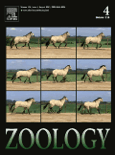
ZOOLOGY
Pioneering discoveries in the world of animals.ZOOLOGY, an esteemed journal published by Elsevier GmbH, stands at the forefront of research in the Animal Science and Zoology fields. With a notable impact factor and recognized as a Q1 category journal in its discipline, ZOOLOGY is highly regarded among researchers, ranking #98 out of 490 in Scopus rankings. Founded in 1994 and continuing through to 2024, the journal aims to publish cutting-edge, peer-reviewed articles that contribute significantly to the understanding of zoological sciences. Based in Munich, Germany, ZOOLOGY provides both subscription and open access options, ensuring that influential research reaches a wider audience. It serves as an essential platform for disseminating innovative findings, connecting scholars globally, and fostering interdisciplinary collaboration to advance zoological knowledge.

RUSSIAN JOURNAL OF THERIOLOGY
Advancing the Frontiers of Terrestrial EcosystemsRUSSIAN JOURNAL OF THERIOLOGY is a prominent academic journal published by KMK SCIENTIFIC PRESS LTD in collaboration with the esteemed Moscow State University. As a dedicated platform for researchers in the fields of Animal Science and Zoology, Ecology, Evolution, Behavior and Systematics, and Plant Science, this journal strives to advance our understanding of terrestrial ecosystems and their inhabitants. Although it currently holds a Q4 ranking and ranks within the lower percentiles of its respective categories, the journal's consistent publishing output since 2011 showcases a commitment to facilitating scientific discourse and collaboration. Addressed to a diverse audience of researchers, professionals, and students, RUSSIAN JOURNAL OF THERIOLOGY serves as an essential resource for disseminating valuable insights and fostering future advancements in the biological sciences.

Avian Biology Research
Elevating the discourse on avian species and their ecosystems.Avian Biology Research, published by SAGE PUBLICATIONS LTD, is a leading journal dedicated to advancing the study of avian species through high-quality, peer-reviewed research. With an ISSN of 1758-1559 and an E-ISSN of 1758-1567, this journal has established itself as a vital resource within the fields of Animal Science and Zoology, as well as Ecology, Evolution, Behavior, and Systematics. The journal is currently ranked Q3 in both categories according to the 2023 release of the category quartiles, and it contributes significantly to the global understanding of avian biology, including behavior, physiology, and conservation efforts. Positioned within the competitive landscape of the Scopus rankings, it finds itself amidst a diverse array of research, with medical and environmental implications. As an open-access journal, Avian Biology Research ensures greater accessibility to its contents, fostering disseminative opportunities for researchers, professionals, and students alike. With a publication window spanning from 2008 to 2024, it continues to be an invaluable platform for the dissemination and dialogue of avian research, thereby enlightening future inquiries and driving scientific advancements in this crucial area of biology.